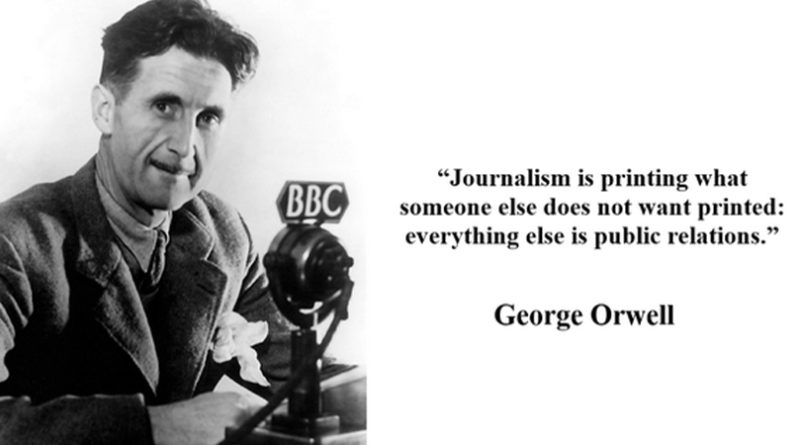Editorial: Intimidating local journalists is a direct threat to democracy
By Brandi Makuski
On June 28, 2018, a gunman entered the Capital Gazette newsroom in Annapolis, Md., and opened fire with a 12-gauge shotgun. Five newsroom employees were killed; two others were injured while trying to escape.
In the wake of the tragedy, newsrooms across the nation employed extra security measures. Some reporters were even temporarily taken off in-field assignments. The news industry, and the nation, were scared and outraged, and rightfully so. Never before had such violence befell a newsroom, and it’s considered the deadliest attack on journalists in American history.
The gunman reportedly had a longstanding problem with the newspaper’s reporting on charges brought against him for harassing an acquaintance from high school.
In other words, verbal abuse escalated to violence, and five people were killed for doing their jobs.
While such an extreme example of newsroom violence is thankfully rare in this country—and no staff member at the Metro Wire has ever been physically harmed for doing their job—there remains a far more acceptable form of intimidation against news reporters.
In Portage County, it happens far more often than many people realize.
After almost 18 years of covering news in Portage Co., I can tell you that local reporters are rarely threatened with violence. There are instances of harassment, especially if a story is controversial, but it usually takes the form of angry telephone calls and anonymous emails.
Lately, though, directly calling out an individual by name and insulting every conceivable aspect of their perceived skills and personality has become a stock-in-trade for some of the poorly-moderated Facebook group pages in our area. And like any form of bullying, the gossip takes the place of the facts for people who don’t, or won’t, educate themselves by reading the stories behind the paywall, themselves becoming complicit by furthering the false narrative, itself a danger to democracy.
Ironically, Facebook is the very reason many news outlets require paywalls at all—because the advertising money lost to social media has forced news companies to seek subscriber revenue just to keep the lights on.
By and large, bullying and exploitation of journalists are far more subtle, often obvious only to the perpetrator, the reporter, and a few others who might be paying attention. The subtlety makes it easy to deny—and very effective for the small minds who place any weight on hearsay.
The news scene in Portage Co. is in real trouble; we’ve lost 13 professionally-trained journalists from multiple news outlets in the past three years. The most recent was Alan Hovorka, the last full-time journalist at the Stevens Point Journal, who was cut during a mass layoff in August after parent company Gannett announced a dismal second quarter. He’s since been replaced by a Seattle transplant who, at present, only works part-time.
Unfortunately, the majority of our county’s losses have not been replaced.
One publication has attempted to fill the gaps with regional, as opposed to local, news coverage; another utilizes writers with little-to-no training who publish press releases from local elected officials, or single-source stories out-of-context, painting local government activities in a positive light. The Metro Wire alone is steadfast in providing hard-hitting, thorough reporting of only local government, business, crime, and community.
But some in positions of power take full advantage of these circumstances. Knowing that many local news outlets no longer have the staff or training to point out inconsistencies, ask tough questions, or otherwise conduct due diligence in their reporting, it can be very easy to publicly criticize the few of us left in the county who do our jobs correctly, either because people want to discredit the reporter or because seeing it done correctly has become so uncommon that a person can’t recognize it.
Fighting back against this form of intimidation, or ignoring it entirely, isn’t easy, nor for the thin-skinned. It’s a boulder we’ll be pushing uphill for our entire careers.
On the local level, professional journalists cover issues that are unabashedly nonpartisan and not open to interpretation through a left- or right-leaning lens. Street reconstruction projects. Local crime. The mayor’s travel expenses. A finance committee vote. All topics we have covered and will continue to cover, at length—and with supporting data, statistics, and other facts, with multiple relevant sources. While you may not like the data as it’s being presented, that doesn’t make it biased.
I stand firmly behind the reporting of our news staff. We’ve published many exclusive stories and done a large amount of investigative reporting on serious issues facing Portage Co. and Stevens Point.
Intimidating a reporter based on how a story is framed, a summary headline, or because it shines a spotlight on uncomfortable facts, is unacceptable. Journalists in small newsrooms are quite familiar with these intimidation techniques, and we recognize them as a very real threat to democracy at the local level.
But our staff will not be dissuaded from continuing its hard work, and we will continue utilizing best practices accepted in newsrooms across the nation. Regardless of what tactics come down the pipe from the armchair detectives on social media, our coverage will not be influenced by intimidation.
And based on our numbers, a growing number of readers in Portage Co. agree with us.

